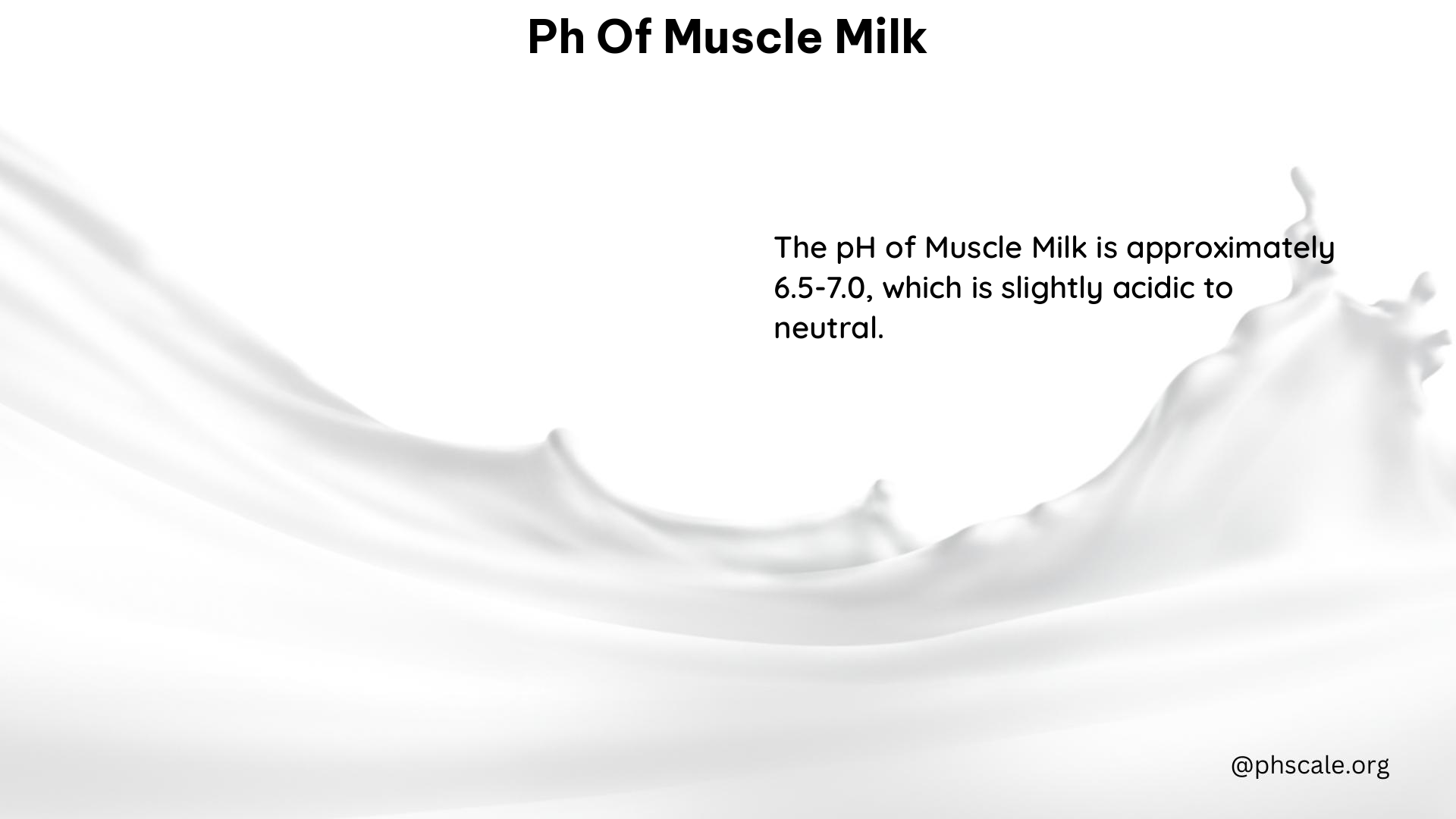The pH of Muscle Milk is a crucial factor to consider for those seeking a balanced and healthy protein supplement. While the exact pH of Muscle Milk is not explicitly stated, understanding the pH levels of its key ingredients can provide valuable insights into the overall alkalinity of this popular protein powder.
pH of Muscle Milk Ingredients
To better comprehend the pH of Muscle Milk, let’s examine the pH ranges of its primary components:
| Ingredient | pH Range |
|---|---|
| Milk Protein Isolate | 6.5 to 7.5 |
| Calcium | Neutral to slightly alkaline (around 7-8) |
| Fructose | Neutral (around 7) |
| Sodium Caseinate | Slightly alkaline (around 7-8) |
| Amino Acids | Varies, generally around 7-8 |
As you can see, the majority of Muscle Milk’s ingredients have a neutral to slightly alkaline pH, suggesting that the overall pH of the product is likely to be in the range of 7 to 8, making it slightly alkaline.
Balancing the pH

The balanced pH of Muscle Milk is essential for maintaining optimal nutrient absorption and overall health. The slightly alkaline nature of the product can help neutralize the acidity in the body, promoting a more balanced internal environment.
Potential Contaminants and Chemicals
While Muscle Milk is generally considered a safe and effective protein supplement, it’s important to be aware of potential contaminants and chemicals that may be present:
- Artificial Sweeteners: Some Muscle Milk products may contain artificial sweeteners like acesulfame potassium and sucralose, which can have negative impacts on gut health and metabolic function.
- Food Dyes: Certain flavors of Muscle Milk may contain synthetic food dyes, which can be a concern for individuals with sensitivities.
- Bone Char: The Muscle Milk Plant Protein Shake may be processed with bone char, making it unsuitable for vegans.
Addressing Contaminants and Chemicals
To minimize the impact of these potential contaminants and chemicals, consider the following strategies:
- Choose Natural Flavors: Opt for Muscle Milk products that use natural flavors instead of artificial sweeteners and dyes.
- Consult a Healthcare Professional: If you have specific dietary restrictions or sensitivities, it’s best to consult a healthcare professional before consuming Muscle Milk.
- Monitor Intake: Be mindful of your overall protein and nutrient intake to avoid overworking your kidneys or exacerbating other health conditions.
Alternative Options
If you’re concerned about the pH or contaminants in Muscle Milk, you may want to explore alternative protein powder options:
- Natural Protein Powders: Look for protein powders derived from natural sources like pea, rice, or hemp, which may have a more neutral pH.
- Homemade Protein Shakes: Create your own protein shakes using whole, natural ingredients to control the pH and nutrient content.
By understanding the pH of Muscle Milk and its key ingredients, as well as being aware of potential contaminants and chemicals, you can make an informed decision about whether this protein supplement aligns with your health and dietary needs.
References
- Muscle Milk. (n.d.). Muscle Milk Plant Protein Shake. Retrieved from https://www.musclemilk.com/product/muscle-milk-plant-based-shake/
- Muscle Milk. (n.d.). Muscle Milk Genuine Protein Powder. Retrieved from https://www.musclemilk.com/product/muscle-milk-genuine-powder/
- Healthline. (2017, July 5). 3 Major Muscle Milk Side Effects. Retrieved from https://www.healthline.com/health/food-nutrition/muscle-milk-side-effects
- Muscle Milk. (n.d.). Muscle Milk Genuine Protein Shake. Retrieved from https://www.musclemilk.com/product/muscle-milk-genuine-protein-shake/
- Gatorade. (n.d.). Muscle Milk Pro Series Intense Vanilla. Retrieved from https://www.gatorade.com/protein/muscle-milk-pro-series/intense-vanilla-2-54-lb-canister
- ScienceDirect. (n.d.). Milk Protein Isolate. Retrieved from https://www.sciencedirect.com/topics/agricultural-and-biological-sciences/milk-protein-isolate
- ScienceDirect. (n.d.). Calcium. Retrieved from https://www.sciencedirect.com/topics/pharmacology-toxicology-and-pharmaceutical-science/calcium
- ScienceDirect. (n.d.). Fructose. Retrieved from https://www.sciencedirect.com/topics/agricultural-and-biological-sciences/fructose
- ScienceDirect. (n.d.). Sodium Caseinate. Retrieved from https://www.sciencedirect.com/topics/agricultural-and-biological-sciences/sodium-caseinate
- ScienceDirect. (n.d.). Amino Acids. Retrieved from https://www.sciencedirect.com/topics/agricultural-and-biological-sciences/amino-acids
